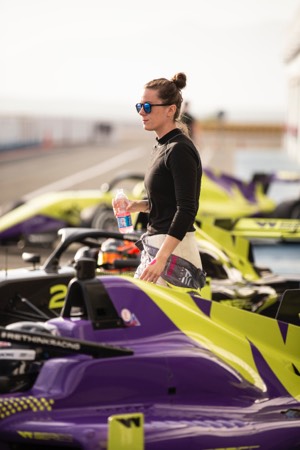Meet the pioneering lesbian racing driver who’s taken up a delivery job to help her survive during the coronavirus crisis

Gay racing driver Abbie Eaton. (W Series)
Pioneering lesbian racing driver Abbie Eaton has taken up a delivery job during the coronavirus crisis, desperate to get back behind the wheel and keep afloat.
Eaton, 28, started driving race cars when she was just 14 years old, having been introduced to motorsports by her dad.
Her career has gone from strength to strength – she worked as a test driver on series two and three of The Grand Tour with Jeremy Clarkson, before recently joining W Series, a global female-only racing series.
But as the sports industry grinds to a halt during the coronavirus pandemic, Eaton told PinkNews what life is like without the adrenaline rush of driving, and how she’s coping mentally, physically and financially.
She said: “I earn my living out of racing, coaching people as a driving instructor for the racetrack, I do TV and film stuff, and now everything has been put on hold, so it’s going to have an impact.
“Personally, I have taken on some work over this period, I’m doing some overnight delivery driving, dropping off next-day goods.”
Eaton said that two or three times per week she drives from her home in Hull up to Scotland and back again.
She continued: “It’s just a something to do to keep your mind ticking over and to feel as though you have a purpose. I’m also just doing my bit to help, you know, just to try and keep the world moving.”
“The W Series drivers are lucky,” she added, “because it’s a fully-funding race season. We’re lucky because when it all goes back to normal, we’ve got a race season waiting for us.
“Whereas, others who have to find the budget to compete, they might be a little bit more worried.”
The lesbian racing driver has been keeping busy in isolation, from juggling to meditation.
As well as delivery driving, Eaton said she has been learning lots of new things to help her cope mentally while in isolation.
She said: “I’ve learned how to juggle, I’m trying to learn how to do the moonwalk, I’ve done a lot of cooking. I’m lucky to have a nice garden so I’ve spent lots of time outside.
“I’m trying to give myself a little bit of what I call ‘soul food’, trying to do things that make you happy, meditating for about 20 minutes every day to set time aside and focus on you, to clear your head and concentrate, I think it’s important.”

Abbie Eaton has been competing in online races to give fans some of the action their missing. (W Series)
Although she’s unable to get back on the track, Eaton has been using a simulator at home to keep her skills sharp, and has been competing in online races for her fans to watch.
She said: “I do a few online races each month when I have the time and [the fans] love having real racers to watch online.
“I’ve just been setting up my account to stream on Twitch, and a lot of people are interested in what I’m doing and they want to know more.
“They’re all hungry for the action just as much as we are.”
Abbie Eaton publicly came out when The Grand Tour was accused of homophobia.
Early last year, The Grand Tour faced accusations of homophobia after host Jeremy Clarkson ridiculed the LGBT+ acronym, and in the same episode Richard Hammond used offensive stereotypes to repeatedly allude to the idea that Clarkson driving a Jeep means he’s gay.
While the lesbian racing driver said she has “always been openly gay”, the incident inspired her to publicly reference her sexuality.
Defending the show, she wrote on Twitter that it was “so homophobic they’ve even got a gay as their driver,” which said is “apparently how I came out”.
She said that visible LGBT+ people in the motorsport industry was quite a “new” concept, and added: “Motorsport is kind of seen as a bit of an old boys’ club, it’s about testosterone and how brave you can be, and it’s quite macho.
“That’s probably why there might not be as many openly gay drivers in motorsport. But I think it’s changing.”
Eaton is part of Racing Pride, an organisation developed with Stonewall to promote LGBT+ inclusion in the motorsport industry.
“We want to show that we are accepting of people,” she said. “We want as many people in motorsport as possible, and to make it an inclusive place for everyone, and to give those who might be struggling a little bit a bit more confidence to come out.
“I live authentically as me and I’ve been lucky to have a social media following as a bit of a platform. I just want to at least be visible, and if that inspires younger drivers or mechanics or engineers or anyone, then that’s a good thing.”

